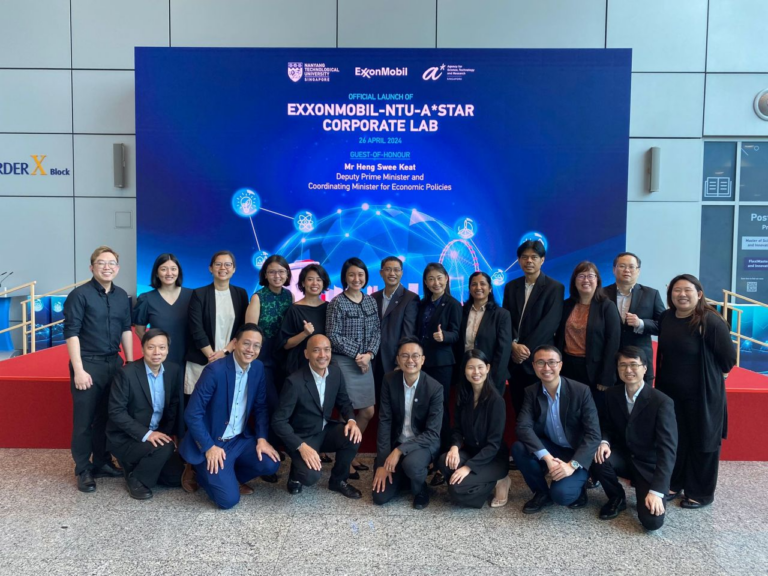A new corporate lab has been established to create solutions leading to lower carbon emissions, boost resource efficiency, and aid in bringing forth a more sustainable future. This lab is a product of a collaboration between ExxonMobil Technology and Engineering Company (ExxonMobil), Nanyang Technological University, Singapore (NTU Singapore), and the country’s Agency for Science, Technology and Research (A*STAR).
 Source: ExxonMobil Singapore
Source: ExxonMobil Singapore
Officially launched on April 26, 2024, the ExxonMobil-NTU-A*STAR corporate lab is the latest addition to Singapore’s emission-lowering agenda, after its port operator, PSA Singapore (PSA), and shipping company, Pacific International Lines (PIL), agreed to co-develop sustainable solutions to cut carbon emissions and optimize maritime efficiency in November.
Geraldine Chin, Chairwoman and Managing Director of ExxonMobil Asia Pacific, remarked: “I’m excited that ExxonMobil with its global leadership in energy and material technology, will continue to work with Singapore’s world-class researchers to accelerate research development for a lower-carbon future.
“Our involvement in the translational R&D stages can help scale up projects for commercial deployment. We look forward to collaborating with our corporate lab partners on innovative discoveries that can help change our industry and the world.”
As part of this collaboration, companies will be able to use the country’s scientific capabilities to address real-world challenges, and innovative enterprises will get a chance to gain insights into new options for application through the partnership between the industry and academia, therefore staying globally competitive.
Lim Keng Hui, A*STAR’s Assistant Chief Executive, Science and Engineering Research Council, Professor, noted: “A*STAR’s collaboration with ExxonMobil and NTU signifies our shared commitment to achieving a carbon circular economy through technological innovations. The corporate lab combines ExxonMobil’s industry expertise with A*STAR’s and NTU’s cutting-edge research, to accelerate technological deployments for a more resource-efficient future in support of Singapore’s net zero goals.”
Researchers in the S$60 million (nearly $44.1 million) corporate lab will apply their expertise to enhance global research efforts in lower-emissions technologies in five areas over the next five years. This includes converting biomass into fuels with lower greenhouse gas (GHG) emissions, which will be used in aviation, maritime, and chemical sectors that are potentially more cost-effective and efficient.
Furthermore, it entails carbon capture and utilization using by-product industrial brines, such as desalination brine to produce alternative construction materials. The third area focuses on turning methane into low-carbon hydrogen and solid carbon materials by developing new process technologies to produce hydrogen from natural gas while identifying potential and new applications for carbon. This comes on the heels of IEA’s recent calculation that curbing the fossil fuel industry’s methane footprint by 75% this decade is expected to cost about $170 billion.
The fourth area aims to develop efficient carbon capture and carbonation technology for industry by-products to produce solid carbonates for use in building and infrastructure applications, while the fifth highlights producing and validating concrete with carbon materials for large-scale deployment to enable durable and sustainable building and construction applications.
Lam Khin Yong, NTU Vice President Professor, said: “The partnership between NTU, ExxonMobil and A*STAR is an example of how close collaboration with academia, industry, and public agencies is crucial in developing innovative solutions to address real world challenges.
“This is in line with NTU’s long-term strategic efforts to tackle grand challenges facing humanity and will build on NTU’s deep expertise in sustainability to help amplify Singapore’s on-going efforts to develop low carbon solutions. The new corporate lab ensures that our research results have the opportunity to be translated into impactful, real-world innovations, bringing us closer to a cleaner and greener future.”
Launch of the ExxonMobil-NTU-A*STAR corporate lab; Source: ExxonMobil
The research programs are expected to lead to technical disclosures, patents, and prototypes, but also provide a platform for training graduates, research engineers, postgraduates, and postdoctoral fellows in the carbon circular economy. Additionally, they could contribute to Singapore’s energy security, unlock new socio-economic potential, and help support its progress towards a net-zero future.
“The Corporate Lab by ExxonMobil, NTU and A*STAR is a first in Singapore launched with a global energy player. The joint lab is a valuable addition to our ecosystem that will spur solutions for a greener future, while developing home-grown talent in R&D and sustainability here. Singapore is a location where innovation and diverse partnerships thrive, and we continue to welcome like-minded players to join us in developing low carbon solutions from Singapore for the world,” highlighted Lim Wey-Len, Singapore Economic Development Board Executive Vice President.
The focus on lowering emissions is in line with ExxonMobil’s five-year corporate plan, in which the oil major earmarked$17 billion on greenhouse gas emission-reduction projects over the next five years. To this end, the firm acquired Denbury, a developer of carbon capture, utilization, and storage (CCUS) solutions and enhanced oil recovery, last year.
The company’s CEO recently said that the plan to tackle climate change and fulfill energy needs should include pairing other technologies with renewables to curb emissions while transitioning to a low-carbon world. A few months later, the President of ExxonMobil Europe explained that Europe needed a policy change for projects and technologies required for the energy transition agenda to move forward.





